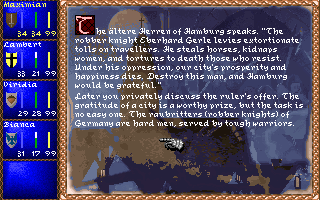From The CRPG Addict
Someone should make a comprehensive study of the criminal archetypes that have come and gone–made obsolete by sociology or technology. The itinerant snake-oil salesman; the train robber; the yo-ho-ho kind of pirate. The Nigerian Prince must be on his way out–too many people have heard of him. We have plenty of robbers, but no more highwaymen. In America, the classic pickpocket is essentially dead except in a few isolated cities, and the stereotypical car thief is hearing the bells toll.
In medieval literature, perhaps no extinct criminal archetype stands out more starkly than that of the raubritter, or “robber knight.” The term’s meaning changed slightly over the centuries, sometimes describing a landowner who abused his power to exact tolls, sometimes describing actual banditry, sometimes (as in the description above) both. But what the term always denotes is a rich person who uses his wealth to purchase armor and castle walls and thus the ability to act with impunity, until he stirs up enough trouble that other rich people with castles and armor decide to deal with him. This is an odd idea–the use of wealth to commit principally physical crimes. Imagine if instead of just ruining the country economically and spiritually, the Waltons and Kochs decided to build “Iron Man” suits and physical fortifications, then go on rampages through villages, knowing that local law enforcement officers would be powerless to stop them. There’s a story in that somewhere.
 |
| My party achieves victory over one of the villains. |
Robber knights form the near-exclusive stable of “bad guys” in Arthurian and other medieval heroic literature, granted with the occasional supernatural twist. The various Green Knights, Black Knights, Red Knights, Sir Bruce Sans Pity, and their lot are all essentially robber knights. Perlesvaus even has a character of of that name (he is defeated by the Coward Knight, who then becomes the Bold Knight). You can’t read an Arthurian story from the 12th to 15th centuries in which the hero does not, at some point, come to a bridge or ford guarded by a mysterious armored figure who refuses to let anyone cross until they pay a usurious toll. The hero naturally thrashes the villain making this demand, but what’s notable is that only someone who can afford the same types of armor, weapon, and steed even has a chance. It’s what T. H. White was getting at when he had Merlyn say:
What is all this chivalry, anyway? It simply means being rich enough to have a castle and a suit of armour, and then, when you have them, you make the Saxon people do what you like. The only risk you run is of getting a few bruises if you happen to come across another knight. Look at that tilt you saw between Pellinore and Grummore, when you were small. It is this armour that does it. All the barons can slice the poor people about as much as they want, and it is a day’s work to hurt each other, and the result is that the country is devastated. Might is Right, that’s the motto.
It makes sense, then, that robber knights make up a major villain class in Darklands, essentially occupying the role of pirates in Pirates! They have randomly-generated names and castles, but wherever the game situates them, they’re such a menace to the surrounding area that multiple political and economic leaders will pay you to get rid of them. And just like Pirates!, you can get multiple rewards for defeating the same villain.
The game adds a dose of realism not found in the typical RPG, however, when it comes to the aforementioned use of armor. I haven’t worked out all the math yet–I’ll leave that for a later entry–but it feels like the protective value of armor increases exponentially rather than in the somewhat linear manner used by Dungeons and Dragons-style games. Leather hardly does anything at all, and plate practically makes a man a walking fortress. There are associated encumbrance and agility penalties, but they’re still worth it.
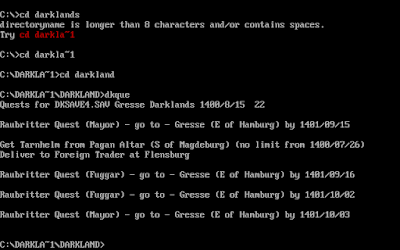 |
| A secondary application brings up your quest log. I think this is the first RPG that keeps track of quests for you. |
As I began this session, I had received a quest from several people to kill the robber knight Anton Seibt, but an initial foray into Seibt’s territory suggested I was far from the necessary abilities to do that. Thus, I settled into Lübeck for a period of grinding and character development. My quest log showed that I had about a year to kill Seibt and get back to Flensburg before the quest expired.
I visited the alchemists’ and tinkers’ guilds and got permission to train, and I spent some days in residence at the inn, some characters working odd jobs, some training. At night, I occasionally ventured into back alleys, fought thieves, and sold their equipment the next day. My character slowly developed skills in edged weapons. Once I figured out that in the markets, you can scroll past the initial four options displayed for sale, I bought everyone shields and missile weapons. (To fund all of this, I sold most of the potions my alchemist started with.)
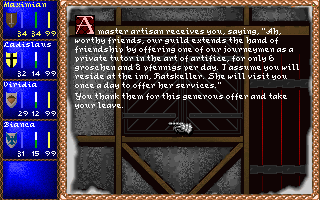 |
| A guild master agrees to teach “Artifice” to my characters. |
Occasionally, I left the city and wandered around outside (I tended to favor healing in camp outside, as it’s free). I escorted a few pilgrims, donated to some poor people, and fought an odd wolf or giant spider. (The thieves in town were better opponents because they leave you things to sell.) I wandered up the road to Schleswig to see if I could get the Seibt quest from even more people, but they wouldn’t see me. When I wanted to get back into Lübeck, I sneaked in or charmed the guards to let me in, hoping to increase one of those two skills. One of the things I like about this game is that skills sometimes increase even when you fail at using them.
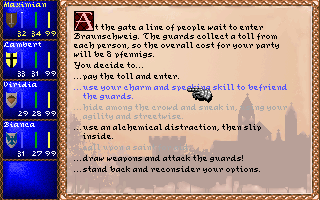 |
| Various options when returning to a city. It costs nothing (as far as I can tell) to try hiding or charming the guards, and has a chance of raising important skills besides. |
For a long time, I was stubborn about Ladislaus, my mentally-damaged cleric. His virtue was so low that it would take years of faking good deeds before a single saint would answer a prayer, and he hadn’t managed to develop much healing skill in only 10 years of monastery service. A couple of points of increases during training didn’t translate to faster healing of my characters; they were still only capable of restoring 1 point of strength a day. Finally, I got fed up, had Ladislaus “retire” (he took one-fifth of my wealth!), and rolled up a more experienced and devout Catholic. Lambert spent four terms as a novice monk, monk, friar, and abbot before joining the party, excelling in virtue, religion, and healing. When my characters rest with him in the party, they restore 2 points of strength per day–which, believe me, makes a big difference. He also starts with knowledge of three saints and an actual chance that they’ll respond to prayers. I just had to build up his skill with a weapon for a while.
 |
| Having sent Ladislaus into retirement, I create a new holy figure with more experience. |
The grinding period was hard. Health regenerates so slowly that you spend more days resting than adventuring. You can’t afford to do it all at comfortable inns, so you have to go outside, but there you run the risk of bandits, wild animals, or just being run off the local lord’s land. Paying for training is also expensive and doesn’t guarantee your skill will actually go up each session. There seem to be a lot of skills you can’t train–at least, I haven’t found trainers yet. Everyone wants a piece of your hard-earned money. You have to pay to enter cities (if other mechanisms fail). You have to pay if you get caught on the streets at night. You have to pay if you’re caught camping on someone else’s land. Except for common thieves, new parties die against practically everyone and everything.
But, slowly, things started to get better, particularly when I made enough money to buy some better armor for everyone. Until then, Maximian–who started with brigantine armor–hardly ever took any damage in combat while everyone else got slaughtered.
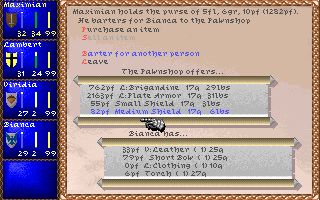 |
| Improving my situation at an armor shop. |
I’ll make a few complaints about combat while I’m thinking about it, reserving greater analysis for a future entry in which I have more experience. 1992 was the first year in general for “real time combat with pause,” and we’ve seen it in both Darklands and Legend. It would, of course, become more famous in the Infinity Engine titles of the late 1990s. Darklands is superior to Legend in that it allows you to issue orders while paused. Right now, there’s not much I can do but attack.
I am having a few problems. First, I want Maximian to bear the brunt of most combats, but no matter how far in the lead I put him, enemies just happily walk around him to engage the weaker characters. Second, the characters don’t do what I tell them to do when it comes to attacking particular enemies. They remain stubbornly engaged with whoever is closest to them even if I repeatedly tell them to go attack someone else. In short, I find it hard to prioritize particular enemies and protect my weaker characters.
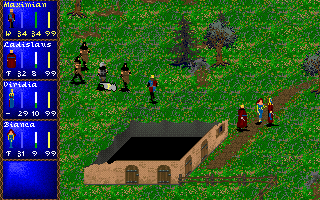 |
| The weaker characters hang back while Maximian goes to engage the enemy. I know half of them will just walk around him and attack the other characters anyway. |
The game is also a bit annoying in its adherence to realism with missile weapons and line-of-sight. I have my third and fourth characters equipped with missile weapons, but they hardly ever have a clear shot at an enemy because the lead characters are in the way. The process of picking up missiles from the battlefield, redistributing them, and re-equipping them is also a bit annoying. Finally, I don’t like the way that the treasures found post-combat are so relentlessly predictable. It would be nice to occasionally meet a back-alley thief whose father had willed him a decent-quality long sword. Instead, thieves always carry falchions or clubs and always have leather armor for the vitals and cloth (which doesn’t sell for anything) for the non-vitals. Other enemies seem similarly predictable.
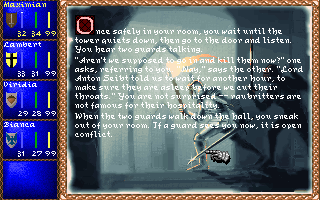 |
| We sneak through the robber knight’s castle. At least we’re not the only ones betraying the Guest Right. |
Back to the story. After about half a year passed, I was at the point where I could defeat several bandit parties per night and didn’t even have to rest for a week afterwards. I decided to try my luck against Anton Seibt again. “Try my luck” is the operative phrase because for whatever reason, everything I tried succeeded beyond my wildest dreams. Acting friendly to his men prevented me from having to fight any engagements during my approach to his castle. When I got to the castle, I knocked on the door and he invited me in for the evening. Later, I chose to have my party go to bed, but then get up and sneak to Seibt’s room, and again it worked. The result is that when I finally confronted him in his room, we fought a four-on-one combat instead of one that involved his warriors. It was almost too easy.
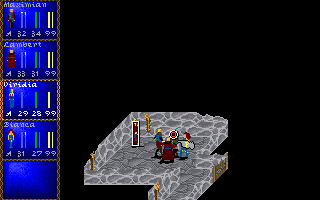 |
| My party gangs up on Seibt in his chambers at night. |
When he died, I looted plate armor from his corpse and gave it to Maximian, passing the brigantine and chain down the line. It uses almost all my encumbrance, and I couldn’t therefore wield the two-handed sword I also recovered from the robber knight. I gave that to Lambert, but using it tires him out quite fast, and I suspect it’s better to keep Lambert equipped with a one-handed weapon.
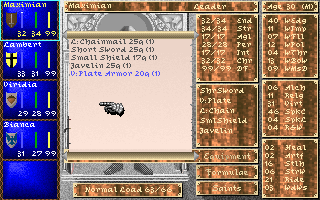 |
| With plate armor for his vitals and chain armor for his limbs, Maximian is just shy of a full load. |
Now the fun part. I returned to Lübeck and got rewards from both the obserte and the Fugger representative. I continued up the road to Flensburg, where I’d started, and got even more money from the Fugger, but for some reason the erbvogt (mayor) had nothing to say to me even though the little quest application insists I had the same quest from him.
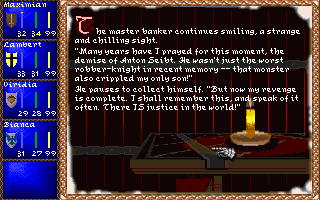 |
| Claiming a reward for killing Anton Seibt. |
In any event, the three rewards loaded me up with more money than I’d even dreamed about before–the equivalent of about 18,000 pfenniges when I’d struggled to top 2,000 before. I bought horses for everyone and splurged on some alchemical ingredients, although none of the shops in Denmark seem to sell the specific ingredients that Viridia needs for the spells that she knows.
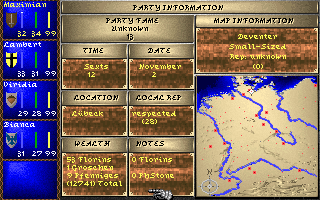 |
| Both my purse and local fame grow. |
The only other quest I had was to get the “Tarnhelm” from a pagan altar southwest of Magdeburg. I decided to head in that direction because it would put me closer to the center of the empire, with more easy access to other locations. On the way, I stopped at several cities, and in the course of meeting with various representatives, got the same quest from several of them to destroy the robber knight Eberhard Gerle, who was hanging out east of Paderborn. I also picked up some minor “fetch quests.”
 |
| Wolves are unhappy with my acquisition of the Tarnhelm. |
The Tarnhelm quest wasn’t difficult. I simply wandered in the area of Magdeburg until I received a notice that I found a pagan altar. After picking up the helm, I had to deal with a pack of wolves, and which point the game indicated that the unholiness of the area had been lifted. I’m not keen to walk all the way back up to Flensburg just to return the helm. I can tell that I’ll be wishing for a fast travel option before the game is through.
At one point, I stumbled upon the house of some kind of seer. She warned me of secret covens of witches growing in power but said that my party was too inexperienced to deal with them. She advised me to “go forth and train, seek experience, adventure, and fame,” and then return. The problem is, I forgot to note where the house was. Is that going to be an issue?
Miscellaneous notes:
- I keep encountering alchemists on the road. They travel with guards and demand all your alchemical ingredients when you encounter them. If you refuse, you find yourself in combat with their guards, who I have thusfar been unable to defeat without a death. They’re very annoying.
- The terrain changes color and texture to denote the changes in seasons. Right now, as 1400 turns to 1401, snow covers the ground. At one point, the game forced me to stop and hole up for a few days to wait out a blizzard.
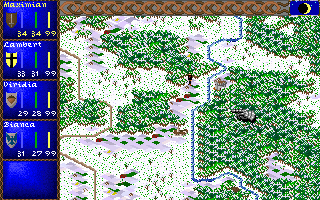 |
| Note the frozen landscape in January. There’s a castle to the east of my party, but I can barely make it out. |
- My colorblindness, or some other factor, makes it difficult for me to see many of the features in the environment. For instance, note the castle to the east of my party in the shot below. I had to really “where’s Waldo” the screen to find it.
- For one of the miscellaneous quests, picked up in Braunschweig, the Fugger representative wants me to help prove that his family is of royal lineage by retrieving a crown from an old tomb. I feel like one of the Pirates! editions had a similar quest, where a random governor wanted help proving that he had royal blood.
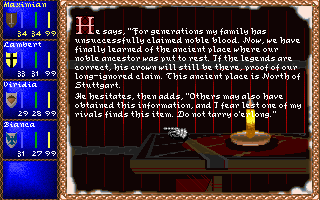 |
| A common MicroProse theme. |
- Both times I defeated the robber knights, the game brought up a message indicating that the party was going to loot the castles’ treasuries. In both cases, nothing got added to my wealth. I guess maybe they weren’t very good robber knights.
- Horses are treated weird. They show up in inventory, and I guess you have to assume they’re being “used,” but you never see them. I hope they’re speeding up my travel.
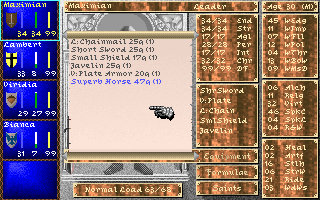 |
| I bought a “superb” horse for my knight, but just regular pack horses for everyone else. |
I finished this session by finding Eberhard Gerle’s castle just east of Paderborn. Surprisingly, the exact same strategy I used at Anton Seibt’s worked here, and Gerle was soon dead. I have no fewer than five people prepared to reward me for the deed, and I also have to figure out if I’m going to try to equip any of my other characters with his looted plate or sell it. Either way, it feels like my money problems are almost over, quite early in the game. Perhaps alchemical ingredients will sap most of it.
For the next sessions, I really need to get a grip on alchemy, praying, combat, and equipment–starting with re-reading the relevant sections of the manual. (Some of my commenters have offered a lot on these issues, but I’ve mostly stopped reading comments on previous entries because it seemed like they were getting spoilerish.) I’ll practice with those as I continue to build my fame across the empire.
Time so far: 14 hours
Original URL: http://crpgaddict.blogspot.com/2019/06/darklands-iron-men.html

